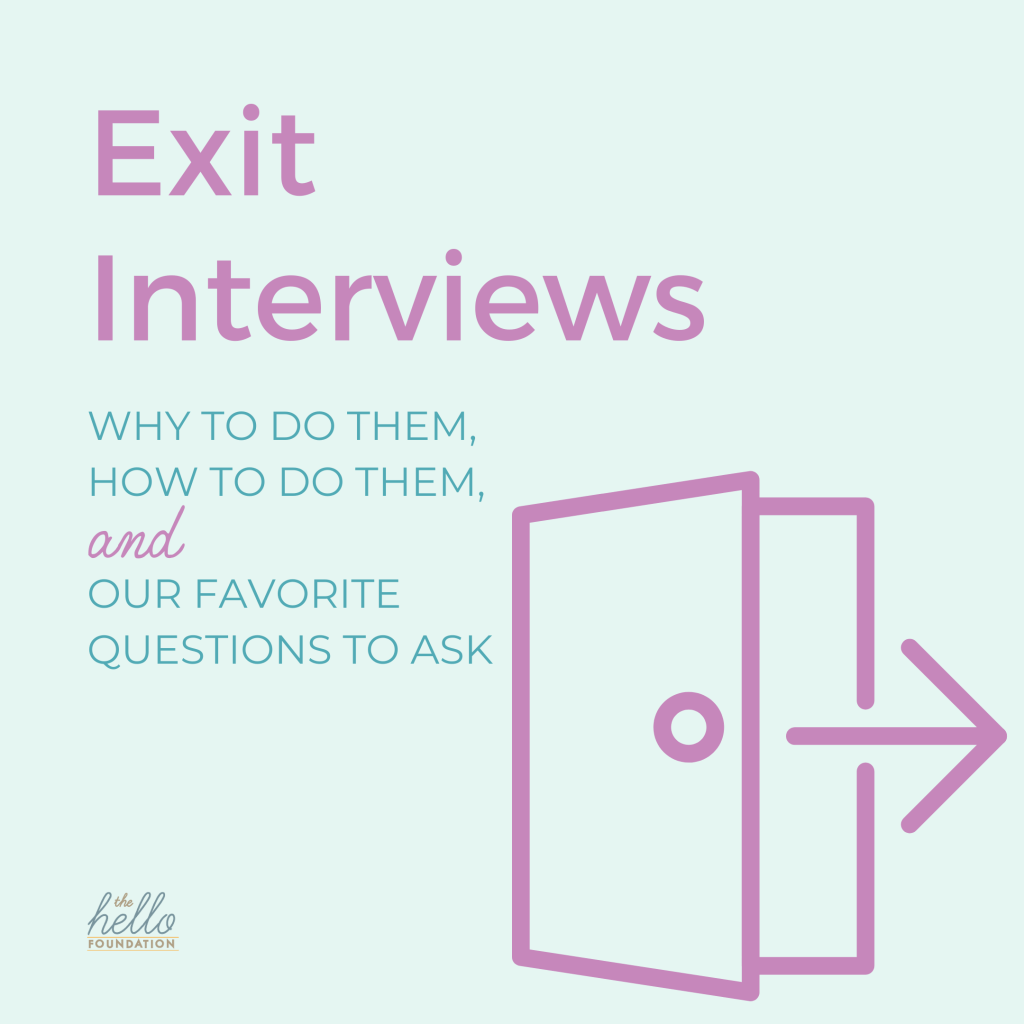Managing hiring in the schools has a unique ebb and flow. Fall is often busy and full of excitement with a new team of professionals in our buildings. Winter brings a lull in the action, save for the occasional need to fill an unexpected leave. Spring is full of highs and lows — signed intents to return next year and the sometimes dreaded letters of resignation. Your first instinct when receiving the latter might be to jump ahead in the flow to thoughts of filling the position. But here at Hello, we’ve learned to hit pause and take the time to conduct an exit interview, and we think it’s worth your time to do the same.
Why Exit Interviews Are Important
Taking the opportunity to chat with each departing employee in an exit interview will help you understand why the employee resigned, what motivated them to leave, and what you can improve upon to ensure the lowest turnover rate possible. Because employees may feel empowered to give more honest feedback as they are leaving than they would have while employed, you’ll be able to get information that current employees may not feel comfortable offering. Even if your HR department already conducts a standard exit interview, the information you can gain from conducting your own can significantly improve your special education program for both employees and students.
Along the same lines, exit interviews give the employee an opportunity to “vent” internally and feel heard. This helps departing employees feel they are leaving on good terms, reducing the likelihood that they will say unflattering things about your district to their peers. You’ll have the chance to wish them well in their new endeavor and even congratulate them if they’re moving forward in a positive direction in their lives.
Finally, exit interviews give the employee the opportunity to ask questions they may have about the separation, such as information about COBRA, turning in equipment, final paychecks, etc. Your district HR department may handle all of this for you, but it’s still a good idea to touch base with the departing employee to make sure that they know everything they need to know for a smooth transition.
How to Make the Most Out of Exit Interviews
Conducting an exit interview requires a time investment, which is something we’re always short on. You can get a bigger return on that time investment by incorporating these steps into your process:
- Schedule the exit interview in advance: This gives your departing employee time to come prepared with helpful thoughts and feedback.
- Come prepared with questions and discussion topics: We’ve shared some of our favorite questions below, but also think about things that are particular to your district and the job that the person is leaving.
- Consider having someone besides the direct supervisor conduct the exit interview: As the saying goes, employees don’t leave jobs, they leave managers, so enlist your peers, your HR department, or even an online survey to help you with the interview.
- Ensure confidentiality: This will give your departing employee extra peace of mind and can help them feel comfortable sharing more sensitive information.
- Turn feedback into improvements whenever possible: Look for patterns among departing employees, even if it’s difficult and uncomfortable, and address those issues head-on.
10 of Our Favorite Exit Interview Questions
The internet is full of examples of exit interview questions! We’ve included our favorites below, but we encourage you to do your own research and think about what makes sense for your employees. Take what you like from our examples below and others on the web, and create a list of questions that are especially suited for your department.
- Why did you begin looking for a new job?
- How could we improve your position for the next person?
- What could we change to make our organization a better place to work?
- Were there any policies or procedures in place that made your job more difficult?
- What supports have been most helpful in your position?
- Would you recommend our organization to a friend or colleague?
- How would you describe the culture of our organization to someone who doesn’t know anything about it?
- Compensation opinion?
- Are they leaving for money or benefits?
- Was there a single event, situation, or decision that made you feel you needed to leave?
Receiving a letter of resignation is often an unfortunate event. But now, armed with the knowledge of why to do exit interviews, how to do them, and your custom-made exit interview questionnaire, you’ll know what to do when you receive one. Your exit interview will provide valuable insights into why your employee decided to leave, allowing you to take action and implement changes that could improve staff satisfaction next school year.






